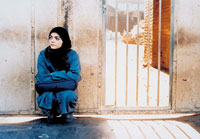

| |||
|
| |||

Seven women find themselves in hopeless situations. We move fluidly along the Teheran trail one evening and glimpse their lives. One woman gives birth to a daughter, an immense problem considering that her in-laws are expecting a new born son ("The ultrasound said it was going to be a boy."). Three tough women, Arezou (Maryiam Parvin Almani), Maedeh (Maedeh Tahmasbai), and Nargesse (Nargess Mamizadeh), are let out of a van, being released from prison on a temporary pass. Arezou tries to help the defenseless and bruised Nargess find enough money to purchase a bus ticket back home. Pari (Fereshteh Sadr Orafai), the main protagonist of the story who finds herself alone on the streets as a result of her brothers' violent threats, needs an abortion and looks up Elham (Elham Saboktakin), an old friend and nurse, only to be refused the help she seeks. (Elham continuously tries to conceal her own criminal past from her husband and won't even dare travel past customs for fear of being uncovered.) Pari later encounters a stranger desperately attempting to abandon her child in the streets with hope that the young girl might find a better future somewhere else. Later the same evening, Pari meets a prostitute picked up by the police at a roadblock. The final scene winds at in a police station, where the harshness of reality reminds us of the painful maternity ward, filled with screams, where the circle began. And so everything ends full circle, only to begin (most likely) once again. Panahi has chosen a documentary style to heighten the realistic effect of this story: sounds are used centrally on the soundtrack without reliance upon musical interludes, non- professional actors give extremely convincing performances, and Bahram Badakhahani's camera captures activities as they seem to really occur in these lives. Threatened by an ever-present, unseen danger that is never truly revealed in any clear or definitive way, they pass their lives living in a constant state of anxiety filled with guilt. Only when they are trapped or incarcerated, do they seem to be able to enjoy even the simple freedom of a cigarette. No, women don't have an easy lot in Islamic Iran under the rule of a harsh patriarchal regime. Any female who steps out of line can expect a punishment of the cruelest sort, be it physical or mental. A sensitive and revealing portrait from the Iranian new wave.

Have a look at the other IFFR reviews
|



